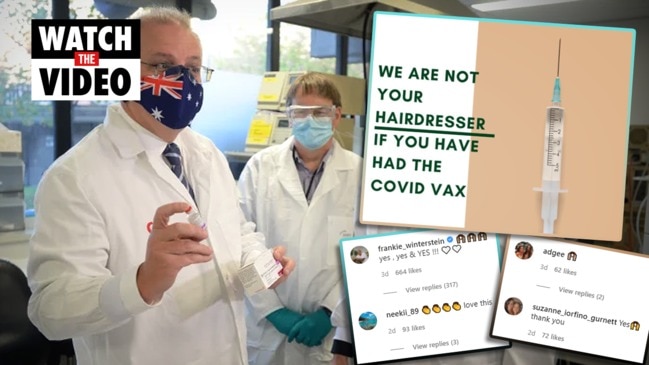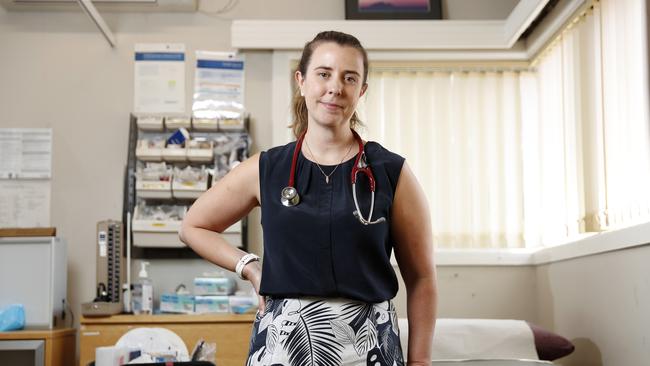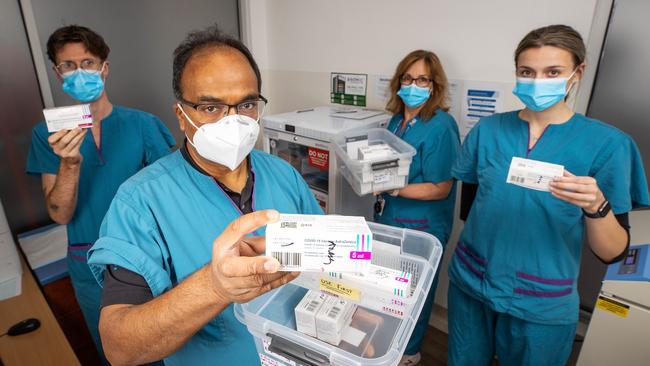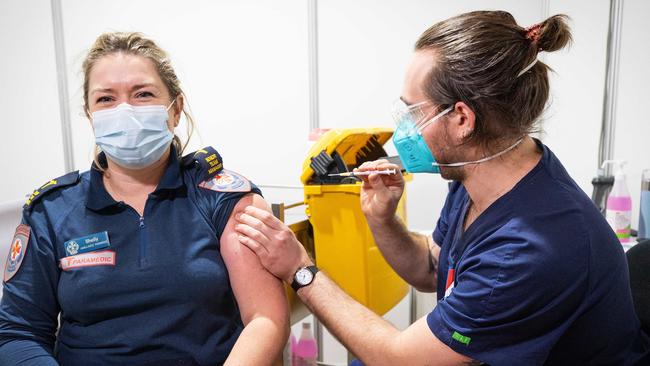Australian doctors’ plea to use AstraZeneca jabs about to expire without fear of being sued
Australians under 60 want the AstraZeneca vaccine, but GPs say they cannot give it to them for fear of being sued and the jabs are about to expire.

Coronavirus
Don't miss out on the headlines from Coronavirus. Followed categories will be added to My News.
Exclusive: GPs are pleading with the Federal Government to indemnify them against giving the AstraZeneca vaccine to those aged under 60 as they warn thousands of batches are about to expire.
As Australia is about to head into peak winter Covid-19 infection season just 5.5 million people aged over 60 are eligible for AstraZeneca, but the country has 40 million doses on order.
Doctors are reporting those aged under 60 are wanting the AstraZeneca jab but they cannot give it to them for fear of being sued.
“People would like to have it, I had people who were coming in on Thursday last week who would happily have had it (the AstraZeneca jab),” former Australian Medical Association president and GP Dr Mukesh Haikerwal said.
But he and NSW AMA president Dr Danielle McMullen said doctors were not confident the government’s medical indemnity scheme would fully protect them if they gave the jab to this group.

“What we would have liked to have seen is a no fault indemnity scheme, so that patients who did suffer an unforeseen adverse outcome have a method of recourse about that, that doesn’t involve having to sue their doctor,” Dr McMullen said.
Avant, one of the key insurance companies providing medical indemnity insurance said it was in discussions with the government and the department of health to introduce measures to address doctors concerns.
Five months into the vaccination rollout 14.6 million doses of Pfizer and AstraZeneca vaccines have been supplied but less than half those doses — just over 7 million — have made it into the arms of Australians.
Fewer than 30 per cent of those eligible for a vaccine have received one and just 5 per cent of the population is fully vaccinated.
Dr Haikerwal said his clinic suffered a 15 to 20 per cent drop in people making appointments for a first dose of a Covid-19 vaccine after the federal government limited the AstraZeneca jab to the over 60s last week.

The vaccines in his fridge expire in August and September and AstraZeneca confirmed the jab, which is being manufactured at the rate of 720,000-1 million doses a week, has a shelf life of only six months.
“I’ve got 1500 at the moment, and I will struggle to use them by the end of September. I might get through them, but I won’t have to order anymore,” Dr Haikerwal said.
Public health expert Bill Bowtell — who oversaw the AIDS campaign in the 1980s — said he knew of a medical clinic on the NSW mid north coast that had been waiting for vaccines for months only to get “a big dump of AstraZeneca, but the expiry date was 30th of June”.
The first 1.5 million doses of AstraZeneca delivered in March would be due to expire in June or July but many were stockpiled by the government for second doses.
It takes two days for GPs to get a delivery of a flu vaccine yet they must wait two weeks for the Covid-19 vaccine after placing an order – and they too are stockpiling second doses.
Health Minister Greg Hunt said federal cabinet had decided 20 million of the excess AstraZeneca doses would be sent to the Pacific.
“Our goal is to make sure that Australian vaccines get to the people who need them most. It was one of the quickest and easiest national security decisions I’ve been a part of,” he said.
The government is actively managing the vaccine supply to ensure all doses are used and if GPs had received doses early and not used it, then that would be a matter for them to explain if they went out of date, he said.
As Sydney’s latest Covid outbreak spreads, Mr Bowtell is calling on the federal government to open the vaults storing vaccines for second doses to get as many first doses as possible into people’s arms now.
“Take every vial of vaccine you’ve got on the shelves now, and put it into every arm you can, so at least people have got one dose,” Mr Bowtell said.
“What I fear is that the collapse of confidence in Astra has actually spread over to become a collapse of confidence about vaccination altogether,” he said.
“We face a real crisis. I think the federal government has proven itself to be utterly incompetent,” he said.
Deakin University epidemiologist Catherine Bennett said often it’s not concerns about the vaccine itself that are the problem.

“Sometimes it’s confusion about where to go, or your doctor doesn’t provide the vaccine … anything that adds to confusion or makes the job of getting a vaccine, more difficult for people who have decided to get it, people have to be determined to get it,” Dr Bennett said.
Health consultant Martyn Goddard has estimated our government will pay around $1 billion for doses of the AstraZeneca vaccine but we are now likely to use at most 11 to 12 million shots.
Health department chief Professor Brendan Murphy revealed this week taxpayers had spent $7 billion on vaccine purchases and distribution.
It was also revealed the federal government is not expecting any of the 51 million doses of the Novavax vaccine it has purchased will arrive this year, with the vaccine not factored into the new rollout strategy released on Wednesday.
Some experts have estimated we need to vaccinate 85-90 per cent of the population to achieve herd immunity against the new highly infectious Delta strain of the virus.
The UK which has vaccinated 56 per cent of its population, the US around 50 per cent, the Seychelles 71 per cent, Israel 59 per cent the UAE 68 per cent.
In all 12 countries have administered enough shots to cover at least 50 per cent of their population.
It is still possible for Australia to vaccinate everyone by Christmas because there is only a three week gap between Pfizer doses but we will have to inoculate hundreds of thousands of people a day to get there.




